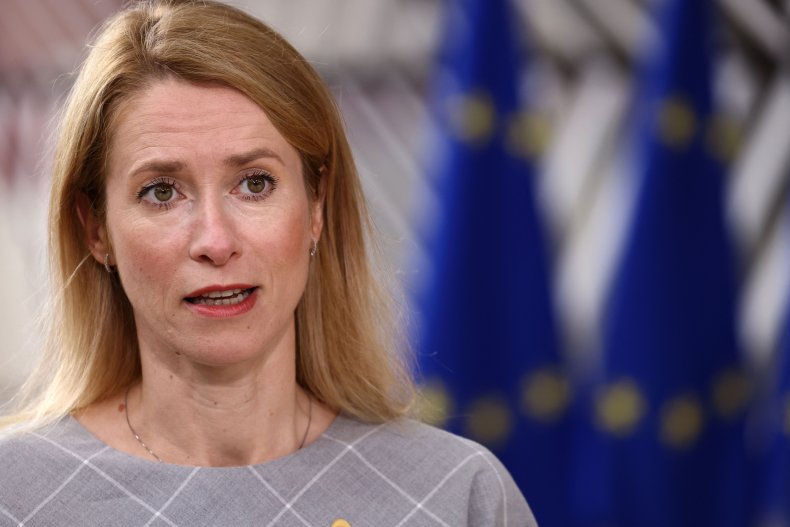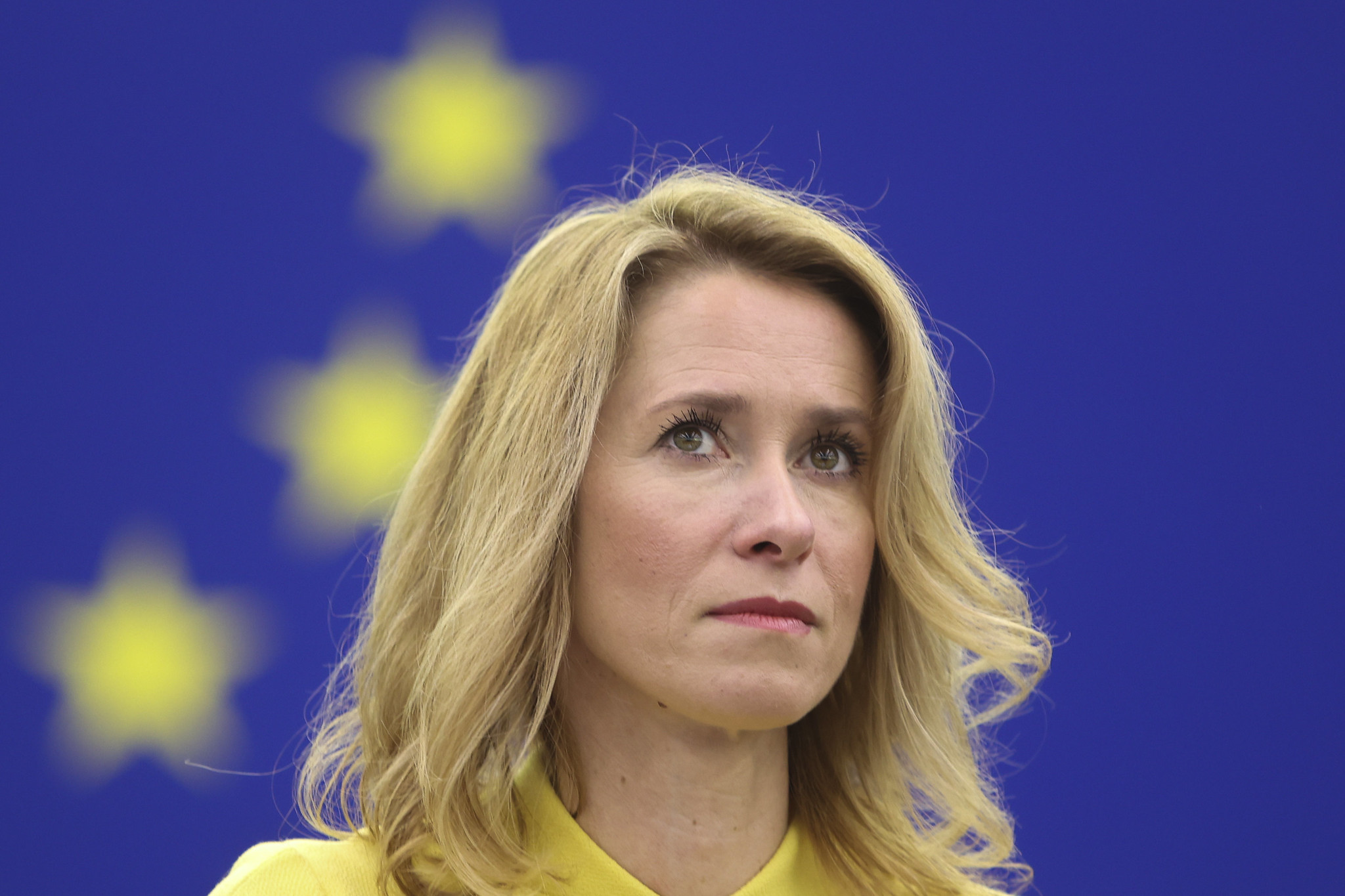Political Turmoil: Pressure Mounts on Estonia’s Pro-Ukrainian PM to Resign Amidst Controversy Over Husband’s Indirect Russian Business Links

Political Turmoil: Pressure Mounts on Estonia’s Pro-Ukrainian PM to Resign Amidst Controversy Over Husband’s Indirect Russian Business Links
Estonia’s Prime Minister, Kaja Kallas, a notable advocate for Ukraine, is facing mounting calls for her resignation following revelations about her husband’s involvement in a company that engaged in indirect business dealings with Russia after the full-scale invasion of Ukraine last year.
Kallas, aged 46, known for her strong support for Ukraine and her vocal stance within the European community, had previously called on all European Union companies to cease their business activities with Russia when the conflict in Ukraine escalated in February 2022. However, recent reports from Estonian media have disclosed her husband’s association with a company that continued to engage in business with Russia post-invasion.
These revelations have prompted increasing pressure on Prime Minister Kallas to step down from her position. The apparent contradiction between her husband’s business ties and her public stance has raised concerns about ethical and political consistency. As the controversy unfolds, Estonia’s leadership is grappling with a challenging situation that highlights the complexities of navigating personal connections in the realm of international relations and political principles.

In response to the growing controversy, Kaja Kallas’ husband, Arvo Hallik, announced his intentions to address the situation. Hallik stated that he would divest his 25% ownership stake in Stark Logistics, a trucking company that maintained a working relationship with an Estonian entity involved in business activities related to Russia. Additionally, Hallik expressed his decision to step down from his roles as the company’s chief financial officer and as a member of the board.
The developments surrounding Hallik’s actions have triggered a series of reactions within Estonia’s political landscape. The opposition has unequivocally called for Prime Minister Kallas’ resignation, citing concerns over the apparent conflict between her public stance and her husband’s business involvements. Meanwhile, members of the center-right, three-party coalition government, to which Kallas belongs, are demanding further clarity and information regarding Hallik’s activities and their implications.
As the situation evolves, the ethical and political implications of these actions continue to reverberate through Estonia’s political and public spheres. The calls for transparency and accountability highlight the complex interplay between personal interests, political leadership, and the expectations of the citizenry in the face of geopolitical challenges.
Arvo Hallik, in a statement conveyed through Estonian public broadcaster ERR, asserted that he and his wife, Prime Minister Kaja Kallas, genuinely believed they were pursuing a just cause by aiding what they perceived to be the right individuals and salvaging a valuable Estonian company. He emphasized that their intentions were rooted in these beliefs and that they acted with the best intentions, potentially saving a valuable Estonian enterprise in the process. Hallik further asserted that his wife was unaware of his business engagements.

The central company at the center of this controversy, Stark Logistics, maintained a business relationship with an entity involved in activities related to Russia, despite Prime Minister Kallas’ outspoken advocacy for discontinuing business ties with Russia amid the Ukrainian conflict.
Hallik’s statement sheds light on the motivations behind his actions and underscores the complexities surrounding the interplay between personal interests, business endeavors, and political leadership. The situation brings to the forefront questions of transparency, accountability, and the potential impact of private actions on public perceptions and policy positions.
Estonia’s internal security service, KAPO, has reportedly confirmed to ERR that companies associated with Prime Minister Kaja Kallas’ husband did not breach any sanctions. This development adds a layer of legal clarity to the situation, indicating that the activities related to the prime minister’s husband did not contravene any existing sanctions.
Arvo Hallik, Kallas’ husband, defended the circumstances surrounding his wife’s decision to provide a loan of 350,000 euros (approximately $377,000) to his holding company, which possesses ownership of the stake in Stark Logistics. This financial aspect further underscores the intertwining of personal and business relationships within the broader context of political leadership.

While KAPO’s confirmation sheds light on the legality of the activities, the ongoing debate and calls for accountability highlight the complexities of navigating ethical considerations, financial relationships, and public expectations in the sphere of political leadership. As the situation evolves, the actions and statements of those involved will continue to be closely scrutinized, shaping perceptions of transparency and integrity within Estonia’s political landscape.
Arvo Hallik clarified the utilization of the loan extended by Prime Minister Kaja Kallas to his holding company. He stated that his company employed the loan funds, along with additional capital, for various financial investments. Notably, he emphasized that the nature and specifics of these investments were never a topic of discussion between him and his wife. Hallik further highlighted that the loan was repaid during the summer, suggesting that the financial transaction had been concluded.
Hallik asserted that throughout his 13-year tenure with the company, he has consistently adhered to legal standards and acted within the bounds of the law. His statements underscore his commitment to ethical practices and compliance with legal regulations.
These clarifications seek to address questions surrounding the financial arrangements and decisions made by Hallik and his company. As the situation continues to be examined and scrutinized, these statements contribute to the ongoing public discourse about transparency, accountability, and ethical conduct within the realm of political leadership and business relationships.

In response to the ongoing controversy surrounding Prime Minister Kaja Kallas and her husband’s business activities, the opposition Center Party group is reportedly contemplating a motion of no-confidence against Kallas. The Center Party has historically garnered support from Estonia’s significant ethnic-Russian minority.
Tanel Kiik, the chairman of the Center Party, conveyed that the unfolding situation has resulted in significant reputational damage to the Estonian state. This sentiment underscores the potential impact of the controversy on the nation’s image and governance. As the situation unfolds and discussions continue, the actions and responses of political parties and leaders will likely shape the trajectory of public sentiment, political dynamics, and the overall stability of the political landscape in Estonia.
Estonia’s President, Alar Karis, who belongs to the Social Democrats – the junior partner in the coalition government, has also called for Prime Minister Kaja Kallas to provide an explanation regarding the situation.
Kallas, at the helm of the pro-business, center-right Reform Party, assumed the position of Estonia’s Prime Minister in January 2021. She secured re-election in March with more than 31% of the vote, with her international advocacy for imposing sanctions on Moscow significantly enhancing her standing. Her strong stance resonated with Estonia’s history, which includes enduring five decades of Soviet Union occupation, further fueling the nation’s commitment to advocating for sanctions on Russia within the European Union.
As Kallas navigates this challenging situation, her political leadership, ethical conduct, and response to the controversies are being closely scrutinized by both the public and political peers. The outcome of this situation has the potential to influence her standing within Estonia’s political landscape, impact the governing coalition, and shape perceptions of transparency and integrity in the realm of political leadership.




